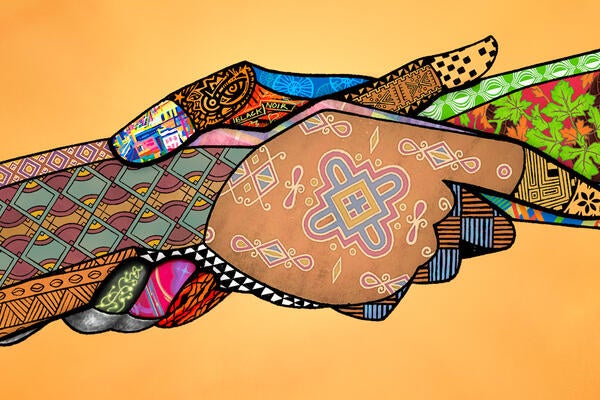
Empowering growth for Waterloo staff
Reflecting on the success of the Cultivating Talent: A Mentorship Collective program

Reflecting on the success of the Cultivating Talent: A Mentorship Collective program
By Valerie Vaz University RelationsThe Fall 2023 offering of the Cultivating Talent: A Mentorship Collective program brought staff together from across the University of Waterloo, for an immersive experience, that focused on personal and professional growth. As a component of the President’s Anti-racism Taskforce, the initiative actively encouraged the involvement of Black, Indigenous and racialized employees across campus.
The five-day initiative was co-organized and hosted by Human Resources, in collaboration with the Office of Equity, Diversity, Inclusion and Anti-Racism (EDI-R), and the Office of Indigenous Relations (OIR). During this period, participants engaged in experiences that allowed them to explore self-reflection, peer mentorship, decolonization, anti-racism praxis, networking and relationship building.
At the core of the program was the mission of cultivating relationships across the University, facilitating personal and professional development while promoting a sense of support and belonging.
“From moment one, I felt safe — safe to be vulnerable, safe to make lasting connections with peers, and safe to share and learn from the difficult and widely different experiences of my peer mentors,” shared one of the participants as they summarized their experience of the program. "It is my deepest hope that I am not one of 18 to have this life changing experience, but one of many who have the opportunity to build this strong network. I’m walking into work with my head higher and my spine straighter. I feel like I am more confident in my ability to lead and collaborate at this University.”
Keynote speakers and expert panelists were also a part of this program as they provided insights on anti-racism approaches to leadership, decolonizing of thoughts and commitments, and the realities of working in predominately white institutions. These sessions were larger gatherings, open to the participants, their managers and colleagues. While some conversations and presentations invited participants to uncomfortable spaces that allowed for more meaningful conversations to begin.
One of the sessions was titled Decolonizing the Self and Reclaiming Your Roots and was led by Emily Brant, a Mohawk speaker and inclusive communications manager of Indigenous Relations, within the OIR.
“It seemed like the group had really bonded by day four when I arrived to facilitate a workshop, and created connections and relationships that will continue to support them in their career and journey at Waterloo,” Brant said.
Other workshops covered topics such as storytelling, navigating career changes and vision/career journey mapping. The final day featured the workshop, Insider Outsider: Perspectives and Realities Working in Predominantly White Institutions, led by Jennisha Wilson, director of Anti-Racism within the office of EDI-R.
When discussing Anti-Racist approaches to leadership and hiring practices, keynote speaker Dr. Vidya Shah, a professor at York University, highlighted, “The people who have the capacity to understand the way the selection system needs to be changed, are the best people to be put into situation because they understand what needs to be changed. That doesn’t happen. Instead, you call on people like me to tell you that what they were saying all along was valid.”
More than a lecture, Dr. Shah invited all attendees to work together with their peers and colleagues within their table group to discuss the provided case studies of racism and harm in the workplace. Attendees were encouraged to engage in challenging yet important conversations about institutional, interpersonal and internalized beliefs that need to be challenged.
The panel discussion that was held on day three, which featured Jean Becker, Lili Liu, Laura Mae Lindo and Fayaz Noormohamed, had the panellists engage in conversation on the diverse perspectives of leadership. The panellists engaged in authentic dialogue focused on leadership, mentorship and how to navigate careers in predominately white institutions. Where the panellists spoke about the power of community and love as the foundation of their approach to leadership.
The success of this program reflects the continued, multi-dimensional growth happening at UWaterloo and the commitments to anti-racism, decolonization and inclusion.

Read more
Upside Robotics secures new funding to accelerate the future of sustainable farming

Read more
Discover the meticulous work that uncovered Black stories on campus and preserved them for the future

Read more
A message from the President and Vice-Chancellor
The University of Waterloo acknowledges that much of our work takes place on the traditional territory of the Neutral, Anishinaabeg, and Haudenosaunee peoples. Our main campus is situated on the Haldimand Tract, the land granted to the Six Nations that includes six miles on each side of the Grand River. Our active work toward reconciliation takes place across our campuses through research, learning, teaching, and community building, and is co-ordinated within the Office of Indigenous Relations.